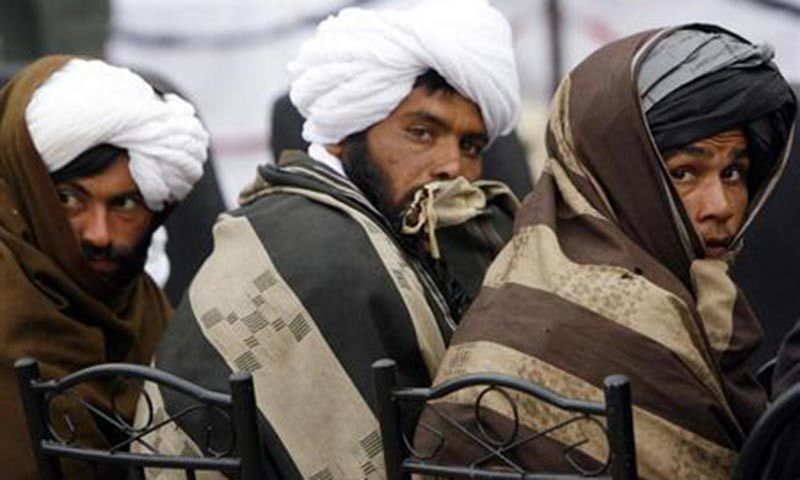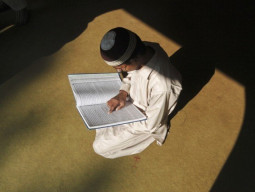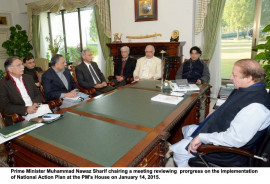
ISLAMABAD:
Facing global pressure to crack down on money laundering, the government sought to deflect criticism that it has not done enough by claiming to have frozen Rs1 billion in alleged terrorist financing.
The claim was made by Syed Mansoor Ali, senior joint director at the Financial Monitoring Unit (FMU), during his testimony at the Senate finance committee, during its hearings on the proposed new Anti-Money Laundering (AML) Act. Ali, however, did not specify over what period this amount was frozen.
Ali said that the actions were taken in order to comply with UN Security Council Resolution 1267 and 1373. Resolution 1267 establishes a global sanctions regime against designated individuals and entities associated with al Qaida, wherever they may be located. Resolution 1373 calls on UN member states to take measures against terrorists, including cutting off their funding sources.
Thursday’s hearing was the second day of the Senate finance committee meetings meant to review proposed amendments to the 2010 law. Disagreements from the previous day appeared to continue: the government, supported by the banks, want a tougher anti-money laundering law, but opposition politicians insisting that the law will be bad for business.
The committee completed a first reading of the proposed amendments to the AML Act and decided to hold a second reading in the presence of senators with legal expertise: Senators Aitzaz Ahsan and Raza Rabbani of the PPP and Senator Farogh Naseem of the MQM.
The government’s stance is that it wants to bring the current law into conformity with international standards laid out by the UN Financial Action Task Force (FATF) . The proposals are aimed at toughening the law to make prosecution of money laundering easier.
A key provision of the amendments is that collecting funds that are subsequently used to finance terrorist activities would be dealt with under the AML regime. The amendment, which uses broad language to define collection of funds, would cover all types of organisations and individuals involved in fundraising.
Under the proposed amendment, the collection of funds will fall in the category of transactions that have to be watched as suspicious transactions, said Muneeb Zia, legal consultant to the finance ministry. The proposed amendments would help the government to ensure that the proceeds of crimes and property involved in money laundering are detected, investigated and prosecuted effectively.
Zia said that a prosecuting agency did not take any actions on many reported suspicious transactions, as it believed that the existing AML law does not provide base to take legal action. To address this concern, the government has proposed that conviction would no longer be a prerequisite to initiate proceedings under the AML Act.
The opposition’s ire, however, appears to be aroused by the government’s proposal to prosecute tax evasion under the AML law. The UN FATF added tax crimes in 2012 to its list of offences that constitute money laundering. Zia said that a country that does not include tax crimes in its anti-money laundering law may face international sanction.
Opposition politicians, however, claimed that this law would impede business activity and raise transaction costs for small businesses.
“Money is being laundered for business activities in the country and many people believe it is not an unlawful act,” claimed ANP Senator Haji Adeel. PPP Senator Osman Saifullah suggested that the law would drive people away from the formal economy.
However, the country’s top bankers appeared to disagree with the opposition senators during the hearings, pointing out that current law is doing more harm to the economy.
“A lax AML law is creating problems for the banks in dealing abroad,” said Nadeem Dar, President of Habib Bank, the largest financial institution in the country, while urging senators to approve the proposed amendments. “Every year, the environment is getting worse and banks are facing increasing difficulties in getting cheques cleared and opening letters of credit abroad,” said Atif Bajwa, CEO of Bank Alfalah.
Published in The Express Tribune, January 16th, 2015.
COMMENTS (1)
Comments are moderated and generally will be posted if they are on-topic and not abusive.
For more information, please see our Comments FAQ






















































Oh so that what PM's visit to Saudia was for ..